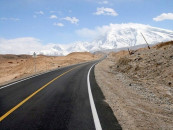SDPI sessions: Lack of free legal aid makes justice a commodity for rich
Govt claims to be working on energy efficient technology to combat GHG emissions

PHOTO: INP
Elaborating on the topic of justice Human Rights Commission of Pakistan Director I.A. Rehman highlighted the inequalities in the provision of justice in Pakistan. He elaborated how justice has become a commodity in the country which only the rich can buy and the poor are deprived of it.
Speaking on women's access to justice in the South Asian region, Law Tribhuwan University Nepal Assistant Professor Apurba Khatiwada discussed Nepal's access to justice by presenting the case study of a rape victim, who was denied access to justice in the court due to financial constraints. Furthermore, he elaborated that women's access to justice has been restricted not only due to the institutions’ inefficiency, but also concerns of privacy, which need to be worked out by providing anonymity to women.
Moreover, speaking at a session titled, ‘Effective Strategies to Combat Extreme Climate Change Impacts in South Asia,’ Ministry of Climate ChangeDeputy Director Dr Zaighum Abbas said that the government is working on introducing ultra-critical and energy efficient technology to combat the effects of greenhouse gas emissions from coal power plants and the industrial sector.
Dr Abbas quoted the example of zig-zag technology in 37 brick kilns in Punjab to combat smog. He further invited international companies to help the government promote the climate change agenda by providing Corporate Social Responsibility (CSR) funds in Pakistan. Dr Zeeshan from National Agriculture Research Council stressed the need for strengthening the crop economy by using highly effective, temperature-tolerant and pollution controlling horticulture crops to resolve the issue of food security and water scarcity in Pakistan.
Published in The Express Tribune, December 7th, 2018.



















COMMENTS
Comments are moderated and generally will be posted if they are on-topic and not abusive.
For more information, please see our Comments FAQ